
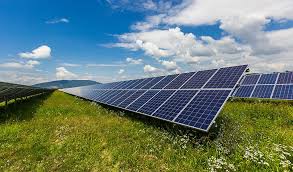
Through the Net Zero Buyers Alliance (NZCB) of the Sustainable Development Roundtable, Akamai Technologies, Teradyne, and Wayfair have signed a consolidated virtual power purchase agreement (VPPA) with BayWa re Americas for renewable energy credits generated from the 135 MW AC Prairie Solar project in Champaign County, Illinois, developed by BayWa re Americas Group and expected to be commercially operational by the end of 2025. Prairie Solar will have a significant impact on the Independent System Operator (MISO) region in central Illinois, where the proportion of low-carbon energy will only be 32% by 2023, making it a carbon intensive power grid. Once put into operation, Prairie Solar will help reduce carbon emissions in the region, which currently heavily relies on fossil fuels. By consolidating demand, Akamai, Teradyne, and Wayfair have overcome the challenge of moderate energy load, which typically hinders independent procurement of renewable energy at the utility scale. This buyer aggregation method led by NZCB makes the acquisition of financial and environmental benefits of renewable energy on a utility scale more democratic, enabling a wider range of enterprises to engage in procurement. We are proud to be part of the second aggregated virtual power purchase agreement in North America, "said Anna Vinogradova, Head of Sustainability and ESG at Wayfair." This project will help Wayfair achieve Scope 1 and Scope 2 emissions reduction targets, in line with our vision for a more sustainable future. Partners like NZCB leverage collaboration to unleash ambitious opportunities for businesses and contribute to a cleaner environment
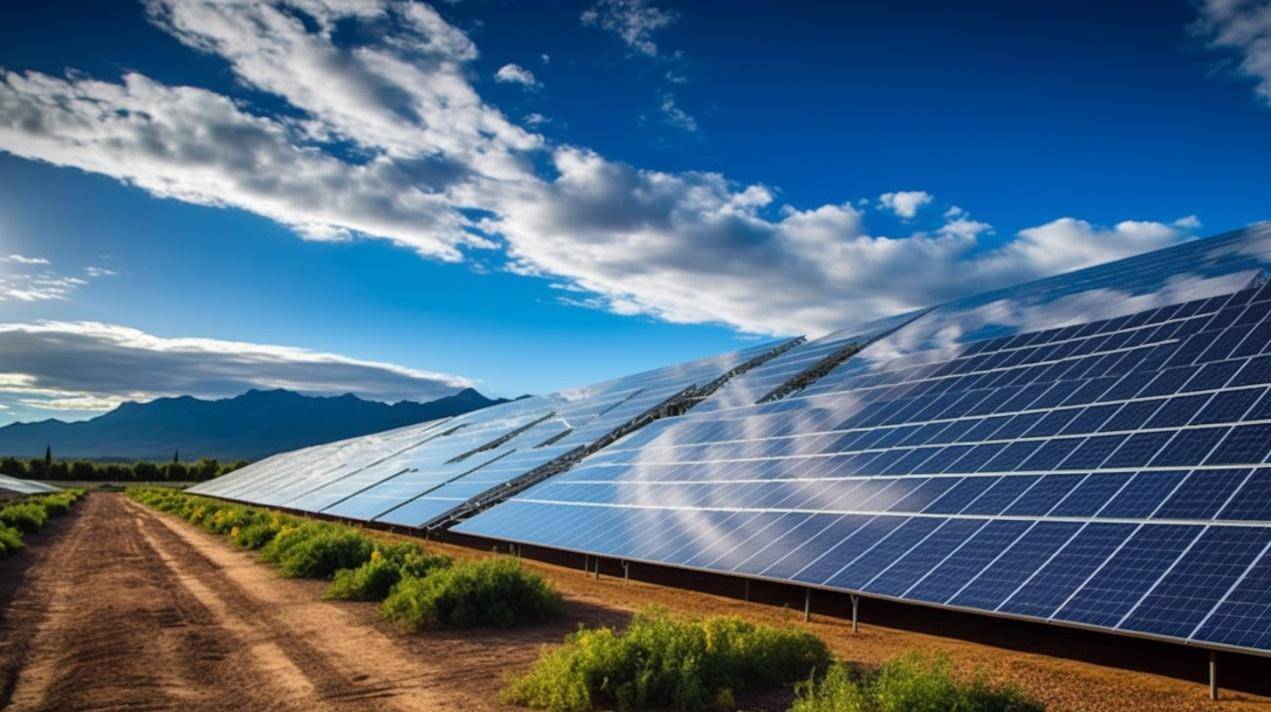
Origis Energy and Tennessee Valley Authority (TVA) have announced a power purchase agreement to expand their solar and energy storage portfolio in Mississippi. Origis will develop, build and operate Hope Solar+Storage in Clay County, Mississippi, which is a 200 MW AC solar energy+200 MW (800 MWh) energy storage facility, and sell electricity to TVA to help promote some of the fastest growth in population and economic development in the United States. Hope plans to enter commercial operation by the end of 2028, but requires completion of all necessary environmental and development permits and approvals. Jeremy Fisher, Senior Vice President and Business Officer of TVA Commercial Energy Solutions, said, "TVA is a leader in the clean energy sector, and we are committed to fulfilling our mission of environmental management to increase the amount of affordable and reliable renewable energy in our investment portfolio. This project is an example of American led energy innovation that creates opportunities, brings economic benefits to communities and our customers, and enhances our country's energy security The TVA report states that the population growth rate in the region is three times the national average, and the GDP growth rate in 2023 is 3%, while the national average is 2.5%. The Origis clean energy complex will help attract and retain employment opportunities in the region. The expected economic benefits of the complex include a recent construction and recruitment revenue of $182 million, and an estimated economic benefit of approximately $7.2 million for the region throughout the entire service life of the facility. Johan Vanhee, Chief Business and Procurement Officer of Origis Energy, said, "This collaboration connects us with our service recipients and is good news for multiple stakeholders. Industrial customers benefit from achieving decarbonization goals. Residential customers benefit from clean energy, which helps achieve reliable, affordable, and predictable electricity prices. Communities near these projects benefit from building economic activity and the employment growth brought by the industries attracted by these projects Prior to the announcement, Origis and TVA's Mississippi renewable energy portfolio included three projects. Earlier this year, the Golden Triangle II was put into commercial operation, a 150 MW AC solar project located in Longz County, equipped with 50 MW battery storage. The other two projects currently under construction are Golden Triangle I located in Langze County, which is a 200 MW AC project equipped with 50 MW battery energy storage and is expected to be put into commercial operation by 2025; And Optimist, located adjacent to Clay County, is a 200 MW AC project equipped with 50 MW battery storage, expected to enter commercial operation in early 2026.

The construction of a new terminal at John F. Kennedy International Airport (JFK) has begun, with 13000 solar panels installed on its roof. The solar panels in Terminal 1 will be the largest in New York City and may also be the largest among all airport terminals in the country. The new all international terminal is an important component of the $19 billion renovation of Kennedy Airport by the Port Authority of New York and New Jersey. There will be a total of two new terminals, two expanded and modernized terminals, and a new road network. The 6.63-megawatt solar cell array on the roof of the terminal building is part of a 12 megawatt microgrid that will distribute electricity from solar energy, fuel cells, and batteries. Rick Cotton, Executive Director of the Port Authority, said, "After completion, the new terminal will become the largest terminal at Kennedy Airport, so we are particularly pleased to incorporate on-site electricity using green energy into the design of the terminal. We have made sustainability a top priority for our facility, and this massive solar array is a unique and innovative solution that can reduce our carbon footprint and continue to move towards net zero emissions In addition, the Port Authority is collaborating with the New York Power Authority to build a 12 megawatt solar roof at Kennedy Airport's long-term parking lot 9, which will also be equipped with a 7.5 megawatt battery and 6 megawatt community solar.

Jamestown, a global real estate investment and management company, announced the installation of solar energy systems at The Exchange at Larkspur Landing, located in Larkspur, California, north of San Francisco. The exchange covers an area of approximately 196000 square feet and 9.4 acres. Jamestown has partnered with commercial energy solutions provider Wunder to deploy a 350 kW solar system that is expected to save energy costs while reducing the property's impact on the environment. The system was launched in June and is expected to generate 570320 kilowatt hours of electricity in its first year of operation. The solar project landed by Lakspo is part of a broader partnership with Wunder aimed at evaluating and deploying solar energy in suitable locations within the Jamestown real estate portfolio and development channels. As real estate owners/operators and developers, we recognize the important role we play in the transition to clean energy. Sustainability has long been a top priority in our business strategy, and we believe it will be a core element of our future success, "said Michael Phillips, President of Jamestown Since the launch of the sustainable development plan in 2008, Jamestown has integrated sustainable development practices into its entire operation. After achieving a 20% reduction in energy and greenhouse gas emissions by 2020, Jamestown has set a new goal of achieving net zero operational carbon emissions by 2050. The company has also adopted the United Nations Sustainable Development Goals and Scientific Carbon Target Initiative, committing to reducing greenhouse gas emissions from its properties and landlords by 30% from the 2018 baseline year by 2030, and measuring and reducing emissions from its third-party sources. In order to align with Jamestown's broader sustainable development goals, the Lakspo Wharf Exchange is based on environmental management. All three buildings on campus have obtained LEED Platinum or Gold certification, with an average Energy Star score of 86 points in 2023. In addition to the solar energy system, the campus also features a central courtyard, abundant green spaces with outdoor seating, electric vehicle charging stations, and bicycle parking lots.
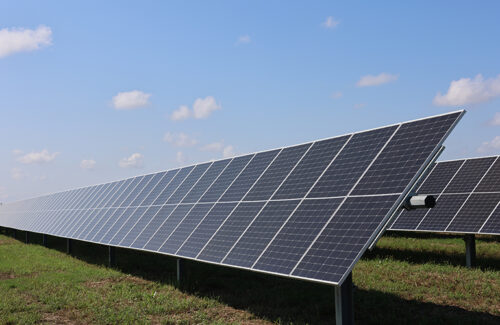
Entergy Arkansas announced the commercial operation of the Walnut Bend Solar Center, adding a new member to its growing utility grade solar power facility. The 100 MW solar project is located in Lee County, east of Brinkley, Arkansas. Antegi Arkansas acquired Walnut Bend from Invenergy, a leading private developer, owner, and operator of sustainable energy solutions. Invenergy led the development, engineering, and construction of the facility. Entergy Arkansas President and CEO Laura Landreaux said, "Walnut Bend will be a valuable addition to our power generation facilities, and in turn, it will complement our diverse portfolio of power generation resources that have provided electricity to the people of Arkansas for over 100 years. Our investment in these power generation resources is a key part of keeping customer payments below regional and national averages, enabling us to provide reliable, affordable, and sustainable services to customers throughout the state The Walnut Bend factory will generate approximately $700000 in property taxes annually for Lee County. The factory adopts innovative technologies, including double-sided solar panels and sun tracking bracket equipment. The double-sided solar panel captures sunlight from both sides, utilizing the reflected light from the ground, while the bracket system adjusts its tilt to follow the sun throughout the day, thereby maximizing energy production. I am pleased to welcome Walnut Bend Solar to my district, "said Senator Ron Caldwell of Arkansas' 10th congressional district." This factory represents a significant investment in Lee County and will bring economic benefits to the local area and even the entire state of Arkansas Walnut Bend is the fourth solar resource put into use by Entergy Arkansas, producing renewable, emission free solar energy for all of its customers. The other three are Stuttgart Solar with 81 megawatts, Lake Village Chico Solar with 100 megawatts, and Searcy Solar with 100 megawatts. These four facilities will collectively produce 381 megawatts of electricity for Entergy Arkansas' customers.

Solar developer Verogy announced the completion of two rooftop solar projects totaling 898 kilowatts of direct current on buildings owned by INDUS Realty Trust at the New England Trade Port (NETP) in Windsor, Connecticut. The 2560 solar modules of the solar cell array installed on the roofs of 110 and 220 Tradeports will provide reliable clean energy and contribute to the state's decarbonization efforts for the next 20 years. The installation of these rooftop solar arrays is in line with INDUS Realty Trust's sustainability plan, including having a positive impact on the communities where INDUS operates, "said William Herschel, CEO of Verogy. INDUS Realty Trust has set an example for how renewable energy can bring economic and environmental benefits NETP is a 4.3 million square foot commercial park developed by INDUS Realty Trust. In addition to providing convenient access to Bradley International Airport and the I-91, 1-84, and I-90 corridors, NETP is also part of a federally approved Foreign Trade Zone (FTZ # 71) and airport development zone, offering numerous incentives to eligible tenants. INDUS is committed to enhancing its investment portfolio through environmental practices such as solar installations and energy-saving upgrades. Michael Gamzon, President and CEO of INDUS Realty Trust, said, "We are pleased to celebrate the completion of the Tradeport 110 and 220 solar facilities. These projects mark an important step forward in improving the environmental sustainability of our investment portfolio. This achievement would not have been possible without the hard work of our team members and the professionals at Verogy and Titan Energy INDUS Realty Trust has hired Hartford energy consultant Titan Energy to identify and assist in selecting Verogy as the solar development company, which will build, own, and operate solar panels at 110 and 220 Tradeports, and receive incentives from the Connecticut Non Residential Energy Solutions (NRES) program. Titan Energy, Verogy, and INDUS Realty Trust have collaborated to complete the 110 and 220 Tradeport projects.
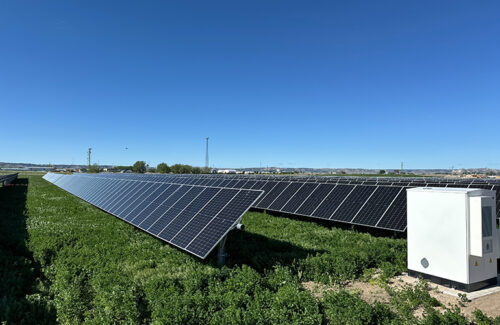
GenPro Energy Development has completed the construction of a microgrid powered by solar energy and energy storage for CS Precision Manufacturing in Green, Nebraska. This solar microgrid is the first of its kind in the state, powered by 1560 550 watt solar modules and three BYD Chess 120 kilowatt energy storage units. A few years ago, CS Precision Manufacturing began to see solar energy as a viable option to subsidize energy consumption, "said CEO Scott James. We quickly realized that the many benefits of solar energy go far beyond financial aspects. Environmental benefits, partial energy independence, stable energy costs, and community responsibility were the key factors driving our decision to implement a solar farm. Solar energy is a clean and renewable energy source that does not emit any greenhouse gases. By reducing our dependence on traditional energy sources, we will minimize our carbon footprint and help address climate change to the greatest extent possible Before converting the facility to solar energy, CS Precision hired GenPro Energy to conduct a feasibility study. When we launched the project in 2020, the interval data provided by the utilities was very limited, "said Molly Brown, who led the development of GenPro. We have installed data loggers at every utility service and collected 1-minute interval data for a whole year After collecting and uploading interval data for analysis, other technical issues need to be addressed. This facility has four different types of power services. GenPro has partnered with Gering's power company and its wholesale supplier, the Nebraska Municipal Energy Authority, to reconfigure the interconnection between the facility and the distribution network. The design of microgrids can store energy and use it when demand increases, thereby offsetting peak usage times. Compared to fossil fuels, solar energy provides a more stable cost structure.
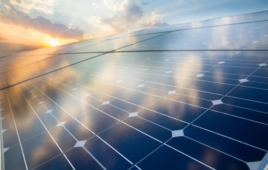
Sandhills Energy plans to commence construction of two solar projects in Indian Nora and Waverley, Iowa, each exceeding 4 megawatts. These projects are part of Sandhills Energy's ongoing collaboration with the Nebraska Municipal Energy Authority (MEAN) to strengthen renewable energy generation and promote energy independence in 16 communities across 15 locations in the Midwest. The on-site construction of these two projects is expected to begin in the first quarter of 2025, awaiting final environmental approval from the US Department of Agriculture. Indian Nora and Waverly are one of four MEAN member communities located in Iowa, ready to develop solar energy. Through this partnership, Indienora Municipal Utilities (IMU) and Waverley Utilities (WU) can obtain wholesale electricity supply from MEAN and combine solar power with traditional energy sources to improve the resilience of the local power grid and reduce costs during peak electricity periods. Denver and Seget Bluff communities will install similar solar facilities by 2025. As Western Union strives to diversify its power structure, solar energy is an important component, "said Curt Atkins, General Manager of Western Union. As our hydroelectric power units retire in 2022, new solar cell arrays will replace the electricity produced by hydroelectric power units The 4.2-magnitude power plant located in Nora, India, covers an area of 25 acres and is owned by IMU. It is expected that the summer peak load will decrease by 10% and the winter peak load will decrease by 40%. The solar power plant located in Waverley covers an area of approximately 24 acres and can provide up to 6.5 million kilowatt hours of electricity annually. Indian Nora Municipal Utilities Company will not only provide reliable electricity in the coming years; we will also create a cleaner and greener future for our community, our children, and their children, "said IMU General Manager Chris Desplanques. Sandhills Energy and MEAN held groundbreaking ceremonies in June in Alianes and Sidney, Nebraska, launching the construction of 15 solar facility series. The solar facilities in these member communities will account for 5% of the energy usage in 16 cities. Raki Giannakouros, Executive Vice President of Sandhills Energy, said, "The First Solar Series 6 photovoltaic panels in these solar facilities are very suitable for the situation in the Midwest region, with anti hail, anti snow chassis structures and the industry's best anti-aging warranty. In the turbulent utility market, solar projects will provide stability and first day savings, which are expected to increase over time as wholesale energy prices rise

Every year on the 15th day of the eighth lunar month, every household celebrates this festival to pray for family reunion and a bountiful harvest. Here are some traditional customs of Mid-Autumn Festival: Eating mooncakes Moon cakes are the traditional food of Mid-Autumn Festival, symbolizing reunion and integrity. Traditional mooncakes come in various flavors, such as bean paste, lotus seed paste, and five nuts. Modern mooncakes are more diverse, including ice skin mooncakes, chocolate mooncakes, and so on. Sharing mooncakes is not only to satisfy taste buds, but also a way to convey blessings and reunion. Appreciating the Moon On the night of Mid Autumn Festival, the moon is at its fullest and brightest, and people often gather together to appreciate the bright moon and express their thoughts and blessings to their loved ones. Appreciating the moon is an ancient custom, symbolizing the longing and pursuit of a better life. Carrying lanterns Especially among children, carrying lanterns is an interesting custom of Mid-Autumn Festival. Lanterns of various shapes light up the night sky, adding color and joy to the festival. Traditional lanterns are made of paper, while modern lanterns are more diverse and can even be glowing plastic lanterns. Family reunion Mid-Autumn Festival is a time for family reunion. No matter where people are, they should try to return home and spend this warm holiday with their loved ones. Family members usually sit together, enjoying a sumptuous dinner and discussing the little things from the past year. Offering sacrifices to the moon and praying for blessings Traditionally, people also hold a ceremony of offering sacrifices to the moon on Mid-Autumn Festival to pray for harvest and peace. This custom originated from the ancient worship of the moon, reflecting people's reverence for nature and their expectations for a better future. The traditional customs of the Mid-Autumn Festival not only display China's rich cultural heritage, but also reflect people's yearning for family, reunion and a better life. No matter how the times change, these traditions are constantly inherited and carried forward, so that every Mid-Autumn Festival is full of strong cultural atmosphere and warm feelings.
Categories
New Products
Tin Roof Rapid Solar Mounting System with Hanger Bolt Read More
Residential Small Solar Easy Bracket Kit for Home Balcony Read More
Automatic Single Pile Solar Tracker with 10 PV Panels Read More
Angle Adjustable Aluminum Easy Solar Panel Bracket for Garden Read More
Intelligent Single Post Dual Row Solar Tracking System Read More
5000ES Solar Off-Grid Energy Storage Inverter Supplier Read More
Multi Drive Double-Sided Single Axis Tracker System Read More
© Copyright: 2025 Xiamen Wintop New Energy Tech Co., Ltd.. All Rights Reserved.

IPv6 network supported